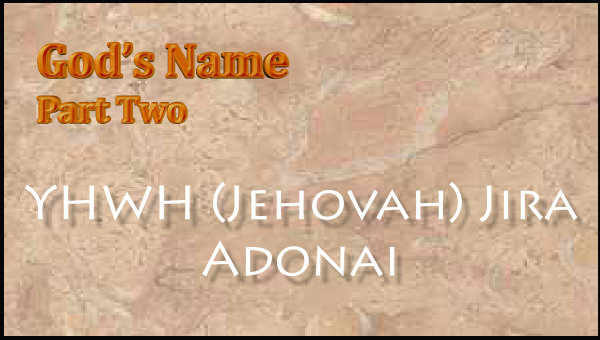By Tyson Thorne

Yesterday we started a study on the names of God and began with the Tetragrammaton, YHWH, the most personal name for God that us usually translated LORD (in all capital letters) in English Bibles. We started there for good reason, it is not only the most basic and personal name God gives himself, but is the foundation for many of the names for God found in the Scriptures. We mentioned yesterday that even though YHWH is written in the Bible many times it was only ever spoken by the priests in the Temple. When outside the Temple the priests used the name Adonai. This name for God means “Master” or “Owner” and represents God’s right to rule as he is the creator and owner of every person. This name for God occurs nearly 300 times in the Old Testament.
Before the people then, the Priest would read a passage from the Law and replace YHWH with Adonai even in the case of compound names of God. YHWY-Jireh therefore became Adonai-Jireh when spoken. To make matters more confusing, early translators mucked up the Tetragrammaton. They tried filling in the missing vowels using the vowel pointing’s from other Hebrew names for God and came up with Jehovah. Therefore, in early English translations of the Old Testament, the four Hebrew letters yod, he, waw and he were translated (incorrectly) as Jehovah. As a result we are largely familiar with these names beginning with Jehovah when in fact they should begin with the name YHWH, such as Jehovah-Jireh.
So we have the Tetragrammaton YHWH written but never pronounced, leading to the substitution of YHWH and Jehovah with Adonai when reading aloud. Since most English readers are familiar with these names beginning with Jehovah, we will keep to the tradition even though it is linguistically incorrect. Furthermore, in the pronunciation guide for each name we will forgo pronunciation for Jehovah and YHWH and instead insert pronunciation for Adonai followed by the additional name. Since Jehovah is really YHWH, and YHWH is substituted with Adonai when read aloud, it only makes sense to use Adonai in the pronunciation guide. So, for example…
The construction of Jehovah Jireh (pronounced Add-oh-nigh Gee-ray) is the name Abraham calls the place God provided a ram as a replacement offering for his son Isaac in Genesis 22.14 and it means “The Lord provides”. The theological implication follows that God provides for his children all they need. Notice it does not mean all that his children “want”, though God often provides for our wants as well. Jesus speaks to this attribute of God in Matthew 6.25-34.
There are eight other such constructions of YHWH, or Jehovah, followed by an attribute of God. Tomorrow we’ll review the other construction-names of God, and next week we’ll complete our lesson on the names of God. The hope is that this will be more than an academic study, but instead be an inspiration to you. By learning the names of God and their meaning you learn about God’s character, and it provides more meaningful conversations between you and your Creator.
|
|
